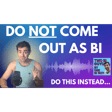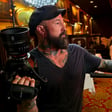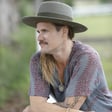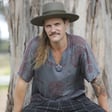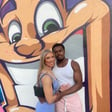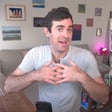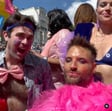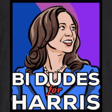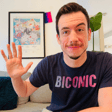Become a Creator today!Start creating today - Share your story with the world!
Start for free
00:00:00
00:00:01

Dear Bi Men: J.R. Yussuf is Back
Welcome back to Bi+ book season! We're picking up right where we left off, interviewing 4 more Bi+ authors about their new bisexual-themed books, and this week I’m so excited to reunite with J.R. Yussuf to discuss his new book, Dear Bi Men: A Black Man’s Perspective on Power, Consent, Breaking Down Binaries, and Combating Erasure. J.R. was one of the first ever guests on this podcast, and it was amazing to hear how much has evolved – for both of us – since that first interview. We chatted about too many things to list, and you won’t want to miss it!
There are over 25 minutes of bonus content with J.R. – and full video of the entire interview – on Patreon.
Additional resources to complement J.R.’s book
Buy my book, Bisexual Married Men
Transcript
Podcast Welcome Back
00:00:00
Speaker
🎵
00:00:12
Speaker
Hello everybody, welcome back to Two Bye Guys. It's been a minute. Thanks for joining us again. I hope you enjoyed the last season of Two Bye Guys, which featured lots of guys from my book, Bisexual Married Men, Stories of Relationships, Acceptance, and Authenticity.
00:00:31
Speaker
And thanks to everyone who has written to me and let me know what they think of the book. I love it. I'm so happy that many of you are enjoying it and finding connections and community and insights for your own lives. Hopefully there will be more books to come and I hope you enjoyed last season. Welcome back to book season. It's the continuation of season six in a way. Season seven was about my book. Season six it's
00:00:59
Speaker
featuring lots of other bi authors.
Season Six Introduction
00:01:02
Speaker
And we never finished the season. We had six amazing interviews with authors who published books about bisexuality or things related to bisexuality, but I like to do ten episodes in a season and keep it even. My book was coming out and there wasn't enough time to finish, but I still have four episodes left
00:01:23
Speaker
And in this episode, I'm so excited to get to chat with one of my earliest bi friends who was on season one of this podcast, helping us kick things off in a few minutes. We'll hear from J.R. Youssef, who wrote a book about forgiveness that we talked about in season one. And now, five years later, he has written an awesome new book called Dear Bi Men, a black man's perspective on power, consent, breaking down binaries and combating erasure.
00:01:50
Speaker
We'll hear from
Patreon Content and Coaching Practice
00:01:51
Speaker
him in a moment. It's an awesome interview. I love getting to chat with him again before we get there. Oh my god, I have like a Wolverine look thing going on today. If you're watching on Patreon, you can see what I'm talking about. Plug for the Patreon. I upload full videos of every episode to Patreon. You'll also get bonus content. Today's episode with JR. I think there's over 25 minutes of bonus content. So if you want to see me and see him and get all of that,
00:02:18
Speaker
head over to patreon.com slash Robert Brooks Cohen. And before we get into the interview, one last thing about my coaching practice. So if you listened to the last episode, which came out a few months ago, I told you guys I was launching a coaching practice. If you haven't listened to that and want to know more about coaching, I did a whole 20-minute intro. Head back to the episode just before this one, and it's at the beginning of the episode. You can hear all about it.
00:02:44
Speaker
But the quick version, it's going very well. I started with a handful of clients who I love working with. We're making great progress with all of them. Just to tell you a bit about my coaching practice and my coaching philosophy. I was trained at IPEC, which stands for the Institute for Professional Excellence in Coaching. It was a seven plus months training program. I just finished it very recently. It was amazing. I learned so much. I got so much practice hours coaching other people in the program.
00:03:14
Speaker
I can coach anyone on anything and that's what I spent the most of my time doing in this program. However, obviously, because of this podcast and my book, most of my clients at the moment are by men. That said, whatever challenges you're working on, whatever you're going through in your life, I can help and I can help coach.
00:03:32
Speaker
The training was incredible and really has defined how I like to coach. I think there's a lot of coaches out there who haven't been trained and they give advice and they have a lot of knowledge maybe about a certain area and that could work for some people. I also have knowledge that I can and do share with my clients, but advice is not the point of coaching for me. I don't think it's super helpful. In coaching, I'm really going to follow you. I'm not going to lead you anywhere.
00:04:00
Speaker
The way that I did things may not be the same way you want to do things. Your values and your goals may be very different from mine. I am an understanding partner. I get all of these issues. I have no judgment and no shame about these things. So you can talk to me about anything, but I'm not going to insert my opinions
Coaching Philosophy and Offerings
00:04:19
Speaker
necessarily. We're going to follow you where you want to go and where you're ready to go.
00:04:24
Speaker
it's my job to ask open-ended, empowering questions that really help you dig into what is the core of what you're struggling with or where you want to be. And oftentimes, I'm finding with some of my clients, it's hard to find a space to do that, especially with someone who gets this stuff. And it's hard to go really in-depth and have an hour-long conversation about this stuff that's
00:04:48
Speaker
hard to talk about, and there's some shame, and there's assumptions other people will make. With my clients, we've been talking about stuff like internal and external blocks. Sometimes we know our goals, and there's an external block to get there. You want to go out to queer bars, but you live in a place where there's no queer bars. Or you want to date another bi person, but there's no bi people on any apps near you. Those are external blocks we can strategize and brainstorm and talk about how to overcome those kind of challenges.
00:05:15
Speaker
But often we think that something is an external block and that's why we haven't done it yet. And really there's something internal holding us back. And that's really the focus of my coaching practice is like figuring out what is going on. And sometimes when we know what we want to do and we have a goal and it just isn't quite happening, that's when there is a hidden internal block and that's what I can help you find out.
00:05:39
Speaker
Sometimes there's fear associated with those things that we want to do them, but there's some kind of anxiety or fear holding us back. Sometimes there's that voice in your head that says, I'm not good enough. We call it a gremlin in coaching.
00:05:53
Speaker
It could be any version of I'm not good enough. It could be I'm not smart enough. I'm not hot enough. I'm not young enough. I'm not queer enough. Those kind of things we can work on together. Sometimes we make assumptions based on the past about how things will go in the future. Sometimes we make interpretations about what other people think. So these are all the kinds of things we can go over and we can discuss. I am offering a nine session coaching package, which I believe is a great amount to really
00:06:21
Speaker
dig into these issues, make some forward progress, set some goals, and see the actual results within a few months. Nine sessions also helps us get some momentum. That said, some people are not ready for nine sessions, and so I do offer single sessions, and you can do as many or as few as you want. There's a discount when you book the nine sessions, but single sessions are great too. Maybe you would just want to try it.
00:06:47
Speaker
Head to my website if you're interested, robertbrookscohen.com slash coaching, or there's a coaching button at the top of the page. I'm gonna put my pricing up there. My pricing, the lucky people who already started coaching with me got a little bit of a discount and this price may not stick around forever. It will likely go up in
New Ventures and Upcoming Interview
00:07:06
Speaker
the future. So if you're curious to do it and interested, now is the time. I'm gonna put my pricing up on the website so that people are more aware.
00:07:14
Speaker
and they know what they're getting into when you book an intro call. If you are interested, regardless of whether you're sure you want to commit, feel free to book a free intro call with me and we can discuss it and we can discuss how this would apply to you specifically.
00:07:29
Speaker
I am also starting to do some group coaching. I actually think if you're listening to this when it comes out, I'm going to do something this week. I don't exactly know what day I want to just start testing it out and practicing and seeing what kind of format works best for group coaching. So I'm going to offer a huge discount.
00:07:47
Speaker
Check the social media for 2ByGuys to find out when and where those group coaching sessions will be. I will post it on the 2ByGuys Instagram for sure. Overall, even without the discount, group coaching will be much more affordable than individual coaching. And while you may not get as much one-on-one coaching time with me, it can also be really valuable to meet other people and see what they're going through and watch them get coached
00:08:14
Speaker
So there's a lot of value to the group coaching as well. So check that out. I'm excited to start group coaching. Oh, I've started doing stand-up comedy. That's sort of a non sequitur. It doesn't really relate to this podcast, but I love it. And most of my set so far is talking about bisexuality and non-monogamy. Shocker, I know. I'm normally not so open about these topics.
00:08:35
Speaker
I don't know exactly why I'm sharing this, it's just something I'm excited about, it's been so fun, I want to keep doing it, and I hopefully want to bring some of that flavor to this podcast, so not that it's not fun to learn things, but maybe we'll throw in a few more jokes. That's all I can think of. This has been long enough already. So without further ado, here is my interview with J.R. Youssef about his new book, Dear Buy Men. Enjoy.
00:09:11
Speaker
Hello, everybody. Welcome back to Two Bye, guys. I'm so excited to be with a familiar face from the beginning of my journey, someone I met way back at my request a long time ago, who has also been on the podcast before. JR Yusuf is back on Two Bye, guys. Welcome back, JR.
00:09:32
Speaker
Thank you for having me. I'm very excited to be here. You have no idea. Yeah, I'm so excited to see you. It's been a while. So JR Yousuf is a Nigerian American New York native. For those of you who don't
J.R. Youssef's Journey and Book Discussion
00:09:47
Speaker
know, he's a writer, director, and actor. He's appeared on stage and in film and TV. He hosts the Let's Heal Already podcast. He created the hashtag Bisexual Men Speak, which we love to use.
00:10:00
Speaker
and he's an award-winning author for the other f-word forgiveness which we talked about last time and his new book he's here on book season this is the continuation of book season even though the first half of book season was like a long time ago we're continuing with some bi authors and his new book i'm holding it up if you're watching the video if you're listening you can't hear it it's called
00:10:22
Speaker
Dear Bi Men, a black man's perspective on power, consent, breaking down binaries, and combating erasure. It comes out in April 2024, which should be when this podcast comes out. And he was one of the first guests on season one of Two Bi Guys. So welcome back, JR Yousuf. Hi.
00:10:44
Speaker
Hi, thank you so much. That was a cool little intro. I appreciate it. Yeah, it's been a minute. And this time I'm back. I'm back with another book. So much has changed, especially in the world and also especially since, you know, you and I first, first, first met. So it's just very cool to be back here. And I'm happy that you still have the podcast going and just keep growing and everything. It's very cool to see.
00:11:14
Speaker
Thank you. I know, I didn't really know what to expect when we started that thing in 2019. But yeah, you and I met probably 2018, I'm thinking. And then we started this podcast in 2019. So man, five years ago, you were here last kicking us off with season one. So let's start there. I'm curious, like since five years ago,
00:11:38
Speaker
What's new for you in this world of sexuality, gender, identity? Has your conception of yourself or your sexuality or identity changed since then or clarified or deepened? What's gone on? Yeah. What a great question. I have learned so much more about myself and the ways that things that I've experienced and witnessed have impacted
00:12:09
Speaker
my expectations of others, my expectations of myself. So my relationship with myself has deepened, which is really, really nice. I've learned a lot more about psychology and neuroscience and the body and
00:12:24
Speaker
white supremacy as we will get to in this interview. And so yeah, I am here. I am existing on this planet. I don't know. It's a lot that I've learned. And I think I've also realized like, oh, I've come to this place where I really need to take a step away from doing a lot of sort of like bi advocacy work.
00:12:52
Speaker
Or at least, or at the very least, certainly shift my position and shift who I'm talking to. And so a lot of this book really is about realizing like, oh, something inside of me is sort of like closing, right? Like sort of my ability to have certain conversations around these topics is closing. And I also recognize that because I've been
00:13:20
Speaker
doing so much research and reading and living, I have amassed a certain amount of sort of knowledge or understanding. And so I wanted to share that kind of as like a last hurrah sort of, that's like, okay, kind of, okay, I'm gonna take a step back or I'm gonna change my position.
00:13:44
Speaker
And so, yeah, I was like, okay, I need to write this book and I am not gonna even think about talking to people who are not bisexual or pansexual or fluid. I'm gonna specifically just talk to us and specifically talk to men or masculine people. And that's what I sort of sought out to do with this book, you know?
00:14:09
Speaker
I love that. And that's the title, Dear Bye Men. That's interesting. I didn't expect you to say that you were going to take a step back from all this and that this is like the last hurrah, pushing it out there. What led to that realization that you want to sort of get this out there and then take a step back? Because I get that. I needed a lot of breaks from this stuff.
00:14:34
Speaker
But also like people are gonna read this and probably want to talk to you about it and want you to come talk about it So how'd that how'd that come about? Yeah lots of burnout lots of unhealthy unhealthy pressure I was putting on myself, but also lots of overextending and also lots of like talking to people who are not bisexual and so
00:15:00
Speaker
I think that there's something about that in particular that for me doesn't work or feels really unsustainable because it is a matter of survival for me. I think similarly, if I were to be spending a lot of time talking to non-Black people about anti-Black racism or things like that, I think that for me personally, there would be something about that that would be not only draining, but
00:15:29
Speaker
just completely unsustainable for me. And so it's kind of like that. And also recognizing, like, you know, I actually want to live. Like, I don't want to spend so much time like teaching or educating or even researching and learning. I want to actually just like live my bisexual ass life. Like, you know what I mean? Yeah, totally.
00:15:54
Speaker
I totally get that. Yeah, maybe I should take a break longer sometimes too. Okay, so this book then is sort of targeted toward by people and maybe even more specifically, like who is this book? Who did you write it for in mind? And like, I won't get into the details, but like, what's your overall sort of mission with this book? Like, why do you want to
00:16:24
Speaker
tell people with this. Yeah, thank you. Okay, so I would say that bare bones, if I had to sum it up in one sentence, this book, I really wrote for masculine people, masculine by people who have thought about taking a gender studies class who have maybe had some college or who have maybe gone all the way through college.
00:16:50
Speaker
and thought about taking a gender sexuality studies class, whether they did or they didn't, they thought about it. That's really who the book is for. Right. That's me. I never got around to taking the gender studies courses, but I thought about it. And then I guess a bit more
00:17:14
Speaker
I am writing this to Black bisexual men, Black bi, Black pan, Black fluid men, masculine people. And yeah, I think that was so important for me because of the specific ways that because of anti-Blackness and white supremacy culture, Black bisexual men have been scapegoated and there is like a lot of like targeted negativity toward
00:17:44
Speaker
Black expressions of sexuality, whether it be bisexual, pansexual, or whether it just be heterosexual desire. And so, yeah, those are some of my target audiences. And I guess, wait, I feel like you asked me another question. What else was in there? Well, what do you want that target audience to take from your book? I mean, we'll get into lots of details, but what's the big picture?
Intersectionality and Identity Exploration
00:18:10
Speaker
Right, right. I think also what I wanted to say about this is that as time continues forward, so many more people are realizing like, oh, I am bi, I am pan, I am fluid, or I just have desire for people of various genders.
00:18:29
Speaker
And so I wanted to have a resource where people can go and like learn more about, you know, bisexual desire, and also recognize how important consent and power is when we are talking about these conversations and have more of like a sort of like a critical eye. Yes. And yeah, hopefully like that consent piece is really in there. You know what I mean? Because I think that
00:18:57
Speaker
just our everyday lives, like regardless of your sexuality, our everyday lives would improve if we all practiced everyday consent and learn more about consent, have more conversations about consent.
00:19:11
Speaker
Yeah, it definitely comes through. I have some questions about that. We'll get to in a few minutes. But I do think that was like a really unique part of this book, this focus on power and consent, because I think that's not always part of the by discourse. Like we're talking about
00:19:28
Speaker
sexual fluidity stuff, but not always how that intersects with just foundational sexuality things like power and consent. And so we'll get into that in a few minutes. It definitely is there. Let's talk for a minute. Your first episode here was titled Femininity and Forgiveness. Your book was about forgiveness.
00:19:53
Speaker
But we talked a lot about femininity and what it's like to, you write in this book a lot about the intersection of being Black, bisexual, and feminine, and how each of those things is a vital component to how people perceive you and what that means for your sexuality.
00:20:14
Speaker
How do I mean, tell us about that intersection. And also, but like, how do you think gender norms and not conforming to traditional masculinity affects both your black identity and bi identity and combined black by identity? Yeah, yeah. So it's just so funny, I think that life, so many things change in life. And, you know, because, as I mentioned in the book, you know, starting out
00:20:44
Speaker
early as I can remember, I was considered feminine and gay and stuff because of the femininity. But as I've gotten older, you know, I'm in my mid thirties now. Over the last couple of years, I've been actually ascribed like masculinity and also like hyper masculinity because I'm black. So a lot of what I'm talking about in the book is being always
00:21:11
Speaker
bouncing between being perceived as either hyper feminine or hyper masculine. So it's always like those two like poles, I guess.
00:21:21
Speaker
And depending on whether I'm perceived as masculine or feminine, the possibility of me being bisexual is if I'm perceived as hyper masculine, oh, yeah, you could be bisexual, even though it's still met with skepticism, but if I'm perceived as hyper feminine, I'm definitely not bi. You know, so I spent a lot of time talking about that in the book and spent a lot of time talking about privilege versus power and how
00:21:49
Speaker
many scholars have talked about how privilege, the word privilege, doesn't quite go far enough and how power is probably a better, more precise sort of way to look at these things, you know? So, yeah. Let's get into that for a minute. Tell me more. I mean, we'll do more jumping ahead, but yeah, why is it more helpful to think of it in terms of power as opposed to just privilege?
00:22:20
Speaker
Yeah. So this is, this is certainly other people's work. This is certainly the work of Deshaun L Harrison and other scholars. But yeah, I've witnessed
00:22:35
Speaker
something happened with words like privilege over the last couple years as it's entered the mainstream and I've witnessed the way people use words like privilege and many people use it as like a sort of like a silencing sort of thing like oh well you have privilege in this way
00:22:54
Speaker
So be quiet, I get to speak, my pain matters. And, you know, I think you could use any word, right, in that silencing sort of way, but it doesn't quite always help, like, help people fully understand, you know, power is something that definitely is pooled in this society, definitely is protected, and definitely ascribed to certain groups.
00:23:22
Speaker
However, power sometimes is also shifting moment to moment, you know what I mean, within conversations. And obviously certain identities, certain classes of people and what have you, those are solid. Those are there, those are pooled there. Power is definitely pooled. Oppression is definitely real.
00:23:52
Speaker
However, power in social situations, certain dynamics are certainly shifting at times, you know, and I think that power gets a lot closer. Privilege sometimes can depend on feelings like, oh, like even though I have these identities, but I don't feel, I don't feel like I had it easier or I don't feel like I
00:24:21
Speaker
didn't suffer. So power kind of gets to something else outside of just feelings. So yeah.
00:24:30
Speaker
Yeah, interesting. And there's so many layers of that that I'm still unpacking. I feel like I talk with my wife a lot about power, even within a conversation, who has power within this conversation and why. And sometimes I don't even notice that and she'll mention, look, you have all the power in this conversation. And it's something I wasn't even aware of. And then we pause and,
00:24:58
Speaker
take that in and so it is really like I think for a lot of like especially someone like me who was identified as a straight white cis guy for 29 years of my life it's like
00:25:14
Speaker
you don't even re- I didn't even realize all the power that I had or because it's so it's it's like oh people believe what you say and like if you don't have the opposite experience like you just think everyone believes what everyone says you know and so like oh I actually have this power that
00:25:36
Speaker
makes it you know it feels natural but actually not everyone has that so it's like it's something I've had to learn to notice.
00:25:54
Speaker
There was a section in somewhere in the first part of the book about that. This comes up a lot on the podcast and with the guys I talked to about their bisexuality about like having more emotional connections with women, but more sexual connections with men.
00:26:13
Speaker
And on an individual level, that can make a lot of sense and is totally valid. But this is a way in which power dynamics work invisibly for many people. You wrote about how that preference can really just come from the power dynamics of patriarchy, because women are conditioned to do this emotional labor. So then we might connect emotionally more easily. Can you talk about that and how that works?
00:26:45
Speaker
Yes. Yes, yes, I definitely can. And yeah, I think that I'm just thinking back to like being a child and even now throughout my life and like, wow, like so many people are able to have even fleetingly fleeting emotional conversations or
00:27:13
Speaker
things like that with girls and women. And it's kind of like second nature. It's like not something that you really even might even think about. You might just like very quickly say something to maybe a barista or maybe like a person that you work with or whatever that you wouldn't say that to a man. And that is one of the ways like patriarchy gets to define who we are, right? It says that,
00:27:41
Speaker
we are not emotional feeling creatures, like, and we are not safe spaces for other people's emotions. And, you know, even if, like, you're probably going to have to do a lot of work to become an emotional safe space for, for people, if, you know, if you're a boy, if you're a man, because that's going to be like, really, it's a lot of people are not going to support you in being that, right? But,
00:28:11
Speaker
just that sort of like automatic, like, Oh yeah, we just know like a lot of women, even if it's the most sort of like callous woman or someone who seems shy or someone who seems a certain way, there's just something there. It's like, Oh no, like this person, yeah, they, this woman, she can, I can say this to her and it's like socially acceptable and, um,
00:28:36
Speaker
I think that I kind of tried to explore some of the heartbreak in that because you might be a man who wants to have these like deeper emotional connections with other men, but you might not know how. And it might be seen as inappropriate. And the person, the man that you're trying to emotionally connect with might not know how to connect with you or might not want to, because once again,
00:29:06
Speaker
they don't see you as sort of like capable of that, of being an emotional safe space. Excuse me. Right. Yeah. So I think that like, this is definitely about sexuality. And it's also about gender. And it's both about
00:29:22
Speaker
the world we live in, in power. It's also about, you know, so many things. Right. Right. I mean, I think that's like a big theme of your book is just like how many different things intersecting can affect everything, any situation. And, you know, sexuality is a big factor and gender is a big factor, but it's not just those alone. Yeah.
00:29:45
Speaker
Right. And, and, and preference. And so like, obvious, like, if, over time, over and over and over and over again, you've experienced so many women, so many girls being just kind or emotionally warm or a relatively safe space, even if it wasn't the deepest emotional conversation, you've experienced so much of that.
00:30:08
Speaker
Right. Of course, that would probably have an impact on who you emotionally prefer to connect with. Like, right? Yeah, it probably will. Like, it makes sense if you you see women as like, Oh, yeah, I would want to have like a relationship and connect and blah, blah, blah. And with men, like, I want to have sex. Like, you know what I mean? Like, yeah, yeah, that kind of makes sense.
00:30:36
Speaker
It honestly makes so much sense that I'm like...
00:30:39
Speaker
almost ashamed of myself for not understanding this sooner. Like, I feel like even a week ago, before I read this, I was like, thinking of myself as someone who has lots of fluid attractions across, you know, like, nothing's a disqualifier to me. But I would say, I tend to connect better emotionally and romantically with women and sexually with men. Like, I even thought that a week ago. And now I'm like,
00:31:08
Speaker
Well, is that actually me or is that actually just like all the women I've ever tried to connect with were conditioned to be good at emotional connection and to to create a safe space for me to feel that way? Like, is it actually me or is it just my reaction to everything around me? Yeah, I've had to rethink that in the last week because of you.
00:31:36
Speaker
Well, first of all, I want to say thank you for acknowledging, oh, I feel some shame here because I think that it's really natural to feel that way when you learn new information and also when so many people have taught us that, oh, as a man, you should know this. You should already know this. You should already be strong. You should already be self-sufficient.
00:32:00
Speaker
And so I want to acknowledge that while reading the book, there might be a lot of shame. And there might be a lot of that that comes up for a lot of people. And I want to just say that it's really normal to feel that way. And it's really important not to shame whatever shame comes up, might come up, whatever feelings might come up, just kind of witness them and observe them. And it's really important to really, I think, investigate our feelings
00:32:29
Speaker
um, which I really hope comes through in this book, like really be curious about our internal world. And I think that like what I just said about curiosity, curiosity about the internal world, like there was just so such a lack of curiosity of my internal world, but by so many people throughout my life. And so like, I think
00:32:53
Speaker
Because of that, it makes me more curious about people's internal lives and especially about men's internal lives.
Impact of Societal Norms and Power Dynamics
00:33:02
Speaker
And I think that just having that curiosity alone can improve your interactions with men.
00:33:11
Speaker
Right. Yeah, that's interesting because I feel like so many people, myself included, make assumptions about people based on gender, presentation, race, whatever, and approaching from a point of view of curiosity about who is this person? And I don't know anything about them until I ask them. That does feel like sort of a better place to be than obviously making assumptions about people. Yeah.
00:33:41
Speaker
Exactly. And the part about like, questioning like, well, who am I? Like, that's what you got to say. And it was so like, beautiful, because it's like, very real. It's like, wait, how much how much of the things that I do like, and that I am drawn to, have been decided for me? How much have I decided? And
00:34:07
Speaker
What then now what does that mean? Who am I? And I had this I had this moment when I was reading the work of Sabrina strings. She wrote an incredible book about the racist history of fat phobia. And really, really, really remarkable book that I recommend to pretty much anybody who will listen to me speak. And I had these really big existential
00:34:36
Speaker
questions come up because when you really learn about the project that is white supremacy you recognize like oh this gets into everything like it's it's it gets into everything like sand it gets into everything it's not just
00:34:55
Speaker
It's not just who we think of as important in society or who is in leadership position. It's not just this. It's not just this. It's, it touches everything. And, you know, in this book, I talk about health and wellness. And for the longest time, that was my thing, right? Being healthy, you know, in this book, I talk about leaving Christianity back in 2012. And part of why I left was like, oh,
00:35:25
Speaker
this is destroying me. Like these beliefs, there's something incongruent. There's something about it that's literally hurting me. Okay. Let's try to be healthy and leave. Let's, and so health was my guiding force. Wellness was my guiding force. And then I spent some time reading, I spent some time living and I realized
00:35:49
Speaker
Ah, health as we know it is also a project of white supremacy. How do you get out? Oh, interesting. What say more about that? What do you mean that health, like, yeah, is a product of white supremacy? Yes. I guess I could take something as simple as the idea of eating three meals per day is normal.
00:36:18
Speaker
and healthy. This was actually part of racism. Indigenous people to North America did something that we now call intuitive eating, right? They've rebranded. It's like, oh, and eat intuitively. Initially, this is what Native American people, indigenous people were always doing. They ate when they were hungry. They ate if they had a super busy day where they were moving a lot.
00:36:49
Speaker
Oh, they ate more that day. If they had a day where they were more sedentary, they weren't as hungry. So they ate less. That was characterized as savage and white people are sophisticated. White people eat three meals per day, consisting of these things and all of that other stuff. That is what animals do. That is savage. No.
00:37:13
Speaker
Yeah, interesting. And there are so, Rob, there are so many examples of like, this is just this is just the three meals a day thing. There are just so many examples everywhere that literally make up our entire world. And so I've gone through, I guess I'm sharing this because I want to say I've gone through many, many metamorphoses. As I've learned more about myself, as I've learned more about indigenous people, I've learned more about
00:37:43
Speaker
people of color all over the world and the project that is white supremacy, I've just learned like, oh, wow. And like, okay, we are witnessing myself feel shame or we're witnessing myself feel lied to or what is even reality? Okay, we're witnessing these feelings and okay, what are we gonna do?
00:38:10
Speaker
what's going to happen? What needs to happen? Or is it enough to just sometimes just witness things and understand?
00:38:20
Speaker
Interesting. That's really fascinating. There's a lot of stuff like that in the book, although either I missed the eating three times a day. I either missed it or it's not in the book. But it reminds me of stuff that's in there and it's really fascinating because it's like, oh yeah, intuitive eating. That makes sense. You don't even think about how the things we all consider normal in our everyday lives are like,
00:38:46
Speaker
that they're a product of these hierarchies and that like many of them take us away from looking inward at ourselves like even that one of just like am I hungry or not like oh it's dinner time I eat dinner but like
00:39:01
Speaker
we forget to check in with ourselves. And I think that's such a good, easy example of how we do that in so many other areas. We don't check in with ourselves. Like even my straightness for the first 29 years was just like very default and really didn't check in with myself on that for many years. And there's just so many other kinds of things that I think are part of my identity that actually
00:39:30
Speaker
the more I dive into it, I'm like, oh, maybe I don't feel that way. I just kind of was following this expectation and I like to people please. So I thought I felt that way, but do I? And then this question of do I, thank you. Thank you for like talking about this because like, do I like that can be incredible.
00:39:59
Speaker
that can look like looking in introspecting can be incredible. And in the case, and in the case of bisexual men, it can also be antagonistic. Oh, but do I really like her? Oh, but do I really like men? Oh, but do I, the question, the two, like, you know what I mean? So introspection is very important. I think that for me,
00:40:31
Speaker
OK, I'm going to share this story. A couple of years ago, I had just started smoking weed. Like I said before, I grew up very religious. So even smoking, smoking, drinking, in those cultures, it's associated with all kinds of just real, real bad. So even though I had left Christianity,
00:40:57
Speaker
there were just always there are all of these little things that still were just like tied to me, you know. So anyway, I started smoking during the pandemic to get through it, you know, and and I kept smoking during the pandemic to get through it.
00:41:18
Speaker
Oh, wait, but we are still in a pandemic. I think I'm met during lockdown. Right, right, right. But it helped me slow my mind down. And it helped me see, like, oh, I do this thing where, like, I'm experiencing attraction to women. And then there's this voice. Oh, but do you? Do you really?
00:41:49
Speaker
Isn't this about what you're supposed to feel? Do you really? And so we'd help me see that. That pattern was still there, right? But I think it's also important to be careful with how we question and how we introspect. And sometimes it can be antagonistic.
00:42:17
Speaker
Yeah, right. It's like kind of if I mean introspection is good but like constant doubting of yourself is the further you know that's then it goes too far if you
00:42:30
Speaker
do the introspection but then can't trust it because you're overthinking it, which I do all the time. So let me ask you this. How do you or how can anyone disentangle your own feelings or your attractions from patriarchy or other hierarchies? They get so tangled up. How do you disentangle it?
00:42:57
Speaker
This is an enormous question. We could do the rest of the episode on this. I'm like always trying to do this. And it's, I don't know, it's hard. It is very, very, very, very hard. Okay. So let's start there. Let's start there. Like, we're talking about
00:43:19
Speaker
foundations of the world that we live in. That's what we're talking about. And so how do you, it's enormous. It's an enormous question. And I think one of the ways certainly is to learn about people who have already been doing this work.
00:43:40
Speaker
to learn about movements like healing justice, that really helped me with all of this healing stuff and therapy and neuroscience. It's like the why, it's the why. We heal to liberate, we heal so we can get ourselves out of these systems. And so it puts, it marries these two sort of like worlds. And I think also like this idea of
00:44:11
Speaker
non-attachment and I'm kind of going to do a really bad job sort of explaining this because this is really from like Buddhist teachings and like you know Indian and Eastern sort of ideas about spirituality and things and I'm gonna try not to overstep too much but essentially a lot of us can over identify with
00:44:38
Speaker
these labels or these concepts out of ourselves or over identify with the story of who we are. So I'll share a personal example. You know, for a long time I thought of myself as like, oh, I'm a really nice guy. I'm really sweet. And I mean, yeah, perhaps like, right? Like perhaps that's kind of where I live and that's where I want to live. And like, that's my neighborhood, right? But there are going to be these moments throughout my life
00:45:08
Speaker
that will never stop coming, where the moment is calling for me to be assertive, to stand up for people, to stand up for myself, to not take shit. There are gonna be these moments, really important moments. And if I'm so identified with, oh no, but like I'm nice and I'm gentle, I don't wanna be a patriarch, I don't wanna be evil, I don't wanna be bad.
00:45:35
Speaker
There are these moments that require me to say, this is where I stop. Don't come over here. Don't come over here. And you have to go somewhere else. There are going to be moments that require that from me. And so if I'm so attached to this story of who JR is, oh, no, I'm so nice.
00:45:59
Speaker
I'm teaching people about introspection. I'm so peaceful. I'm healed. I'm healed, right? I'm healed. That's, that's not gonna, that's not, that's not, that's not being in the present moment. That's being in the story. That's being in something
Media Representation of Bisexuality
00:46:17
Speaker
else. That's being in, oh, like this version of me versus like, wait, what is required right now? What's happening right now? Like I gotta, I gotta remind myself sometimes like,
00:46:27
Speaker
I'm from New York, like, like, like, you got to chill out with Oda, like sit down, like something, you know what I mean? So it's, I think that that has been helpful, like not being so tied to identities and having a clear compass, like the healing justice compass. Those two things have really, really helped me a lot.
00:46:52
Speaker
I love that. Thank you for sharing that. It's very helpful for me too, because I often feel that same way where it's like, yeah, I want to be the nice guy or the smart guy or whatever. And sometimes the situation calls for something else. Yeah, that is really interesting. That makes a lot of sense.
00:47:21
Speaker
So and I want to get to this power and consent stuff again, even though we touched on it. But first, there's a lot of a lot about biphobia in the book. And it's a very important topic to understand for all of us. And I feel like you go even deeper than what I've thought about before about biphobia. I mean, you lay it out, but you go even deeper and you write something that resonated with me, which was that
00:47:46
Speaker
sometimes bi people seem to be the quickest to downplay biphobia or not consider it that big of a deal. And I do that too. I'm like, oh, there is that biphobia, but I can deal with it. And it's not as bad as homophobia and stuff like that.
00:48:07
Speaker
why do you think we do that and how might we like why is this uniquely difficult for bi people and how might we approach that differently? Yeah, thank you so much for this question and like catching that. Yeah, yeah, thank you. Okay, so this for me really came from internalized anti-blackness and so so much of the book is about unlearning internalized anti-blackness and unlearning internalized
00:48:38
Speaker
biphobia. And so, you know, being a, of an oppressed group of an oppressed identity, it can condition you to normalize your oppression. And so you might not see certain things as Oh, so bad. Right? Like, Oh, I've dealt with worse. Right? Yeah, this is not a 10 out of
00:49:04
Speaker
the zero to 10 scale, right? So it's not that serious. And so that is insidious, because that allows you to normalize it. You know, I think that this book could not be written without me having seen, you know, these pyramids of like structures of like how like things like rape culture work or how things like purity, purity culture work,
00:49:34
Speaker
You know, at the tops of these pyramids are like sexual violence against women, sexual violence in general. But at the bottom of the pyramid, the thing that holds the whole pyramid up is like, oh, just little jokes. Like, oh, yeah, yeah, shouldn't wear that. Or just little, little, right? The attitude. The attitude. Exactly. Yeah. That would not exist if we didn't live in this whole thing.
00:50:04
Speaker
the whole thing can't stand if that doesn't exist. And so like, I'm talking about biphobia in particular, I mentioned the show, Love Victor, and how like I talked about it online and I read comments, not just from posts that I've done, but also comments on about the show from bi or pan people. And a lot of them,
00:50:32
Speaker
kind of seemed to have compassion, right? They had compassion for all the gay men out there who didn't realize they were gay until they tried to date a girl and then eventually realized. And I love that compassion. Compassion is important. And also, you can use compassion against yourself, right? And against people of your marginalized background. Look, oh, gay people have it really bad.
00:51:02
Speaker
And they should have their stories told. Yeah, duh. Also, what's also true is, you know, under the LGBTQ plus umbrella in terms of representation, gay white men have had, like they have the monopoly on it. You know what I'm saying? Their stories are the stories. And so what you have with a show like Love, Victor is you have a show that in the trailer,
00:51:29
Speaker
And in the first, I believe I wrote eight episodes. They are showing us a young bisexual boy. Period. That's what they're showing us. Go back to the trailer. Go back to the first eight episodes. They're showing us desire that this boy has for a girl and desire that this boy has for a boy. That's what they're showing us. And then in episode eight, I believe it is things start to get weird.
00:51:59
Speaker
And so I talked about that show in particular because it was such a big show. I really liked it a lot. It was recommended to me. And I think that was one of the first moments where I felt offended by media in a very long time.
00:52:21
Speaker
Offended is not really a feeling that I am very in touch with. I'm not very in touch with feeling offended. But I was offended with that show. And I was like, oh my gosh. Because of how they did it. They showed us a bisexual boy the whole time. And then it's very clear in the writing, you're a writer, I'm a writer, that something changes.
00:52:49
Speaker
Around episode eight, something changes. It's no longer a bisexual boy who is having all of these anxieties of being a teenager and maybe also some internalized biphobia. It's not just that. Something changes in the writing. And they're talking about a gay boy now who's trying to force himself to like her. But that's not what was happening in the early episodes. He wanted to kiss her. He saw her. And sometimes his heart was racing. He had imaginations.
00:53:19
Speaker
That's not the same thing as what happens for the rest of the season. And I haven't seen season two yet. I stopped watching, but yeah. That's interesting. I haven't seen that either. I saw Love, Simon, but not Love, Victor. Partially because I heard some of this stuff and I was like, you know, I'm just not going to get into it. But that makes so much sense. I'm not surprised that that happened. And it's like the same goes back to how can we
00:53:47
Speaker
recognize ourselves and be in touch with how we really are when we see stuff like that and it's like oh here's someone maybe who has a similar experience to me as a bisexual person and then the whole world shifts and says oh this person's gay like the whole conversation shifts it sounds like and so no wonder we doubt ourselves and we constantly check in and think wait am I just gay and I was trying to force that attraction and
00:54:16
Speaker
Like, that's the media representation. Let's talk about that for a minute. Like, in general, the landscape of media representation of these identities, like, what do you think is still missing? And what's the effect of this kind of either by invisibility or negative by representation? How does that affect this community? Once again, an enormous question. I know, you can do it. Thank you.
00:54:45
Speaker
a whole episode on every question and every chapter of your book, probably. Thank you. In the book, I talk about noticing a trend, certainly from when I was younger till now and how that has changed, even if that has only been very small. But certainly when I was younger, it was unthinkable
00:55:13
Speaker
that like, oh, in 15 years or 20 years, there's gonna be some positive representations of bisexual men, bisexual black men. That was completely unthinkable for me as a child, as a young adult. And I would say that when I was younger, it was exclusively negative, exclusively a joke, exclusively horrific at times, whereas now,
00:55:43
Speaker
It's hit or miss a lot of times. And there is certainly a lot of, you know, biphobia by erasure, especially, but there's also some, some shows, some films that get it really right. And it's almost like, whoa, that was incredible. And one that comes to mind is a show called Grown-ish.
00:56:12
Speaker
And yeah, and so there was a relationship between a gentleman named Dez and, and jazz. And what I loved personally about that sort of representation was that, well, first of all, as a black bi man, or actually he uses queer more specifically to him, he uses queer and yeah,
00:56:43
Speaker
This is like somebody who is on the track team, who is out and proud and, you know, definitely is attracted to men and very happy to, you know, yes, love men. And also is like very into women and it just depends on the person. And he also has some fluidity going on in terms of like his appearance, in terms of like what he wears, what he puts on. And so what I love about the show is that
00:57:10
Speaker
there were definitely women who were interested in him and the relationship that he has with Jazz, she's interested in him. And his bisexuality is not a deterrent, but what is a deterrent is his gender presentation. So he's a person who wears dresses, skirts, things like that. And so that kind of becomes something that is like not something that she's attracted to or is able to, I don't know,
00:57:40
Speaker
She's not really interested in that. So what I like about that is because that's like very nuanced. That is like extremely nuanced to me. Like, Oh, like, yeah. Like, first of all, she thought she were gay at first. And it was like, Oh no, like I'm not gay. I also like women. Um, and it was like, Oh, cool. I didn't know that. Cool. And then it's like, Oh, let's date. Yes. Let's date. That's dope.
00:58:07
Speaker
And they have a lot going in common. They're both on the track team. But the more he sort of expresses himself when it comes to gender presentation or just like what he wears, that is kind of the thing. It's not about his sexuality exactly. It's more so about gender and gender presentation and breaking certain rules about gender, not just in the sexuality way, but in the presentation way.
00:58:36
Speaker
And so like, even though like their sort of story ends in like, you know, like heartbreak or like rejection of the bi black male character, which I definitely can see how that can be painful to like a viewer who is also bi and black and maybe also is gender, I don't know, fluid or something, or just presents androgynously. I liked it because it presented that. And I liked it because it highlighted that and also
00:59:06
Speaker
in that same show, they also had a bi character, a bi male character earlier on in previous seasons who was rejected by a bi woman character. And so they were highlighting, they were highlighting like, oh, it's different for guys. Like male bisexuality is reacted in a completely different way than female bisexuality. And so the reason why I liked the representation was because
00:59:34
Speaker
They were highlighting that. It wasn't just like to dunk on by black men. It wasn't just like, yeah, you guys are terrible. Right. It was, it was to show some experiences. So that was so cool to me.
00:59:50
Speaker
Yeah, that makes so much sense. I mean, I haven't seen Chronos. Now I want to watch it.
Bisexuality as a Political Identity
00:59:55
Speaker
But it reminds me of like some goodbye representation that I've connected to and thought sort of, oh, is actually really diving into this in a good way. It was like the show I May Destroy You a few years ago. Did you see that show?
01:00:09
Speaker
Yes, I did. I love that show. I mean, it's good representation of multiple things, not just bisexuality. But what I liked about the bi male character there was that the conflict wasn't dealing with his own bisexuality, it was dealing with biphobia from other people. So which is like so much more, I mean, yes, it can be a struggle to accept
01:00:32
Speaker
are fluidity but like once you get past that then it's like a lifelong struggle against biphobia and so that was really the focus of his storyline was was dealing with this biphobia especially as like a previously gay identified black bi man and so that was I thought
01:00:53
Speaker
great representation, even though it was hard to watch. And also it makes me think of this show sort of, which is about the gender fluidity that you're talking about and how that's related, you know, can be how it intersects with with bisexuality. So it's just like sort of the next level. We're so used to seeing these network shows that are like, oh, the bi guy, who's he going to choose, a man or a woman? And it's like,
01:01:18
Speaker
That's not really what most of us are worried about. What do you want to see more of in terms of media representation? I guess variety. Variety is always what a bisexual answer, right? But yeah, variety, you know, a wide variety of things. I think that's really what a lot of, you know, principled bisexual people, pansexual people are asking for is variety.
01:01:47
Speaker
That's really what a lot of us are asking for. Cool. I love it. Let's move on to this power and consent before we get to bonus stuff on Patreon. Let me ask you the broad question. You mentioned it's in the title, Power and Consent. Why are these important concepts for bi people especially to understand and be aware of? What do you want people to take away on this topic?
01:02:18
Speaker
That's a big question, again. But people have to read the book for all the details. Exactly. I think that, like I mentioned before, because of who my target audience is, I think I am imagining, even if it's not college-aged people, even if you are in your 60s reading this, even if you are in your 40s reading this, 30s, what have you,
01:02:49
Speaker
But this is one of your first times, I guess, realizing that you are bi, pan fluid. The power and consent is like really one of the most foundational things. And these things, consent in particular, create safety. And, you know, that's something that's so missing in our, our world, uh, safety for, uh, marginalized people, really. And so.
01:03:16
Speaker
You know, I wanted people to really focus on power structures because when you talk to principled gay and lesbian people, that's what they're talking about. You know, if they have gripes with bisexual people. Okay, you're bi and you're dating a cisgender woman. Okay, great. Power though, politics.
01:03:45
Speaker
If you're talking to a principled gay or lesbian person, that's really what they're getting at. Okay. What are your politics? What are the politics? Are you against this power structure that exists to harm us? Great. You might have some like, um, societal, like society sees you as like a heterosexual cisgender couple, both of you are cisgender, both of you are heterosexual. Um, and so there's some,
01:04:14
Speaker
Protection to that right and also some pain and erasure to that as I get it as I talk about in the book It's not all just all good, right? But Connecting your queerness or politicizing your queerness politicizing your bisexuality It's already politicized as much as I don't want it to be as much as I don't want to be seen as as radical Just because I'm black Disruptive to the system just because I'm bi
01:04:45
Speaker
That's just what, because the power structure is so racist, anti-black racism, because the power is so cisgender, heterosexist, it politicizes me. And so, are you going to politicize your desire? Are you going to politicize your identities? Are you going to read? Are you going to do critical theory? Are you going to engage? Are you going to do something about this?
01:05:16
Speaker
Yeah, that makes so much sense to me because it's like an especially being in sort of a default hierarchy and being in these the top of the hierarchy for much of my life like it's invisible and then bisexuality sort of
01:05:34
Speaker
gave me like a window into what what it's like to not have all the power and to to have to actually like relate to people differently and I think that politicize like then I realized oh this is a political identity too because it's connecting me to other things when when I hear people say oh I'm not very political like I you know to me that's just such a
01:05:59
Speaker
a luxury to be able to not be political because your identity is not being politicized. So okay, you have the luxury to not care, but the more I've examined myself, then it's like, oh,
01:06:17
Speaker
advocating for this stuff is personal and political, and it's the same thing.
Additional Content and Closing Remarks
01:06:24
Speaker
So that chapter about, you know, you write about Shiri Eisner, who's been on the podcast, I think we might have quoted some of the same stuff that they wrote in our respective books. We have a few some, you also quoted Jane Ward on some of this stuff, I think from two by guys.
01:06:43
Speaker
Yeah, I think I use part of that quote in my book too. You mentioned to buy guys a lot in your book. I appreciate the shout outs. That was very nice. But yeah, it's it really does end up being
01:07:00
Speaker
political like just because of the way the world is like it shouldn't it shouldn't necessarily be like if the world just what was more fair and we cared about every individual and you know everything people are going through then maybe we wouldn't have to make this a political identity but the world is so
01:07:24
Speaker
hierarchical and structured and unfair that once you feel this stuff and understand it, it sort of becomes a political identity naturally if you're really thinking about it.
01:07:47
Speaker
Thanks for listening to this episode with JR Youssef. Hope you have enjoyed it so far. If you want even more, you're in luck. There's more. It's not here, but it's on Patreon. There's over 25 minutes of extra bonus content with JR, plus full video of the entire interview, as well as full videos of every interview from last season and moving forward.
01:08:10
Speaker
In the 25 minutes of bonus content, JR and I talked about consent and power dynamics. We really finally dove into that. We talked about how consent and power dynamics work with men and women and other genders and what can happen in there for bi people as they're navigating that.
01:08:27
Speaker
We talked about the pressure on bi people to quote, pick a side and also the pressure to pick women and to pick having biological kids. It's often not like pick a side, it's often like pick that side. We talked about that. We also talked about like the line between bi sex positivity
01:08:46
Speaker
versus fetishization of bi people. And we also talked about what JR calls and what Robin Oaks calls a biphobia shield. How to shield yourself from biphobia and bi negativity and even internalize biphobia and homophobia. Check it out at Patreon.com slash Robert Brooks Cohen. For more information about everything I do, my book, my writing, my coaching practice, visit RobertBrooksCohen.com. And now here is the very tail end of my interview with JR. Thanks for listening.
01:09:22
Speaker
Well, thank you so much for being here, JR. This has been a lovely conversation and great to see you again after so many years. Hopefully we could catch up in New York someday when I'm there. Tell everyone, okay, when does the book exactly come out and how can people find it and find your other work? Where can they find stuff?
01:09:44
Speaker
Thank you so much, Arav. Okay. The book comes out April 16th, 2024. I'm very excited because it is published by North Atlantic Books, but it's also distributed by Penguin Random House, which means that you will be able to, you will be able to find it anywhere. So also on my website, drusuf.com slash additional, there's also like an online
01:10:10
Speaker
sort of complimentary resource to the book. It's meant to be in combination with the book. So that's where you can call in the stuff.
01:10:19
Speaker
Awesome, I encourage you to check out the website and the editionals because there's a lot of stuff in here like it's I mean, it's a little bit of like a workbook in a way there's like sort of exercises and things to think through and and and I'm assuming some of that kind of stuff is in the editionals too of like What what can you think about in your own life or check in with? So yeah, check that out. Yeah, go ahead
01:10:47
Speaker
Yeah, and it's a lot of it's a lot of support. So you know, in the book, there is like this unearthing of a lot of like, things maybe within some of the readers. And the online resource is tons and tons of support. So if the the read is a little intense for you, if you're feeling like a little like, Whoa, this is a lot. There's a lot of support online.
01:11:12
Speaker
Good. Awesome. Wonderful. And we'll put links to all of that stuff in the show notes. The book is Dear by Men, A Black Man's Perspective on Power, Consent, Breaking Down Binaries, and Combating Erasure. Thanks again for being here, JR Yousaf. Thank you. Thanks for having me. I appreciate it.
01:11:35
Speaker
Two Bye Guys is produced and edited by me, Robert Brooks Cohen, and it was created by me and Alex Boyd. Our logo art is by Caitlin Weinman. Our music is by Ross Mincer. We are supported by the Gotham, and we are part of the Zencaster Creator Network. Visit patreon.com slash Robert Brooks Cohen for bonus content, early access, and exclusive video episodes. Thanks for listening to Two Bye Guys.
